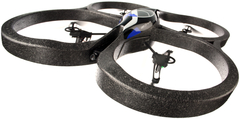Visual Navigation for Flying Robots
In recent years, flying robots such as autonomous quadrocopters have gained increased interest in robotics and computer vision research. For navigating safely, these robots need the ability to localize themselves autonomously using their onboard sensors. Potential applications of such systems include the automatic 3D reconstruction of buildings, inspection and simple maintenance tasks, surveillance of public places as well as in search and rescue systems.
ECTS credits: 6
This course has been distinguished with the Teach Inf Award 2012/13 at our faculty for the best lecture in computer science in the summer term 2013. Thank you very much for your support!
Content
In recent years, flying robots such as autonomous quadrocopters have gained increased interest in robotics and computer vision research. For navigating safely, these robots need the ability to localize themselves autonomously using their onboard sensors. Potential applications of such systems include the automatic 3D reconstruction of buildings, inspection and simple maintenance tasks, surveillance of public places as well as in search and rescue systems.
In this course, we will provide an overview of current techniques for 3D localization, mapping and navigation that are suitable for quadrocopters. This course will cover the following topics:
- necessary background on robot hardware, sensors, 3D transformations
- motion estimation from images (including interest point detection, feature descriptors, robust estimation, visual odometry, iteratively closest point)
- filtering techniques and data fusion
- non-linear minimization, bundle adjustment, place recognition, 3D reconstruction
- autonomous navigation, path planning, exploration of unknown environments
The lecture will be accompanied by a lab course where the students will implement their own visual navigation system. This course is an excellent preparation for a master thesis project in this area.
Lab Course
Exercise sheets will be passed out every other week, containing both theoretical problems and programming exercises (typically in C++). In an exercise group every other week, we will discuss the solutions to the theory problems and the programming problems. Active participation in the exercises is a requirement for participation in the final exam. This will be written or oral, depending on the number of attendees. The questions will cover all material presented in class. During the semester, we offer a weekly lab course where students can get programming support for the quadrocopters for the exercises.
The practical exercises will be implemented directly on a Parrot Ardrone quadrocopter, so we expect a lot of fun (and broken propellers).
Organization
The lecture will be given by Jürgen Sturm.
Lecture: Tuesday, 10:15-11:45, room 02.09.23 (FMI, Boltzmannstrasse 3)
Teaching assistants: Jakob Engel, Christian Kerl
Contact: visnav2013@vision.in.tum.de use this mail address for all questions related to the lecture and the lab course
Lab course/practice: Thursday: 14:00-15:30, room 02.05.014 (FMI, Boltzmannstrasse 3)
Registration: via TUM campus
Note that the number of participants is limited to 30. Registration in TUMonline for this course starts on 28.03.13,12:00.
Schedule
Lectures
The lectures will take place every Tuesday at 10:15 (CT), in the CVPR seminar room (02.09.023). A printer-friendly version of the lecture slides is available here.
| Date | Slides |
| 16.04.2013 | Introduction pdf video |
| 23.04.2013 | Linear algebra, geometry, sensors pdf video |
| 30.04.2013 | State estimation pdf video |
| 07.05.2013 | Robot control pdf video |
| 28.05.2013 | Visual motion estimation pdf video |
| 04.06.2013 | Structure from Motion pdf video |
| 11.06.2013 | RANSAC, ICP, and SLAM pdf video |
| 18.06.2013 | Dense reconstruction pdf video |
| 25.06.2013 | Guest talks (Jakob Engel, Christian Kerl, Frank Steinbrücker/TUM) pdf 1 pdf 2pdf 3 video |
| 02.07.2013 | Path planning and navigation pdf video |
| 09.07.2013 | Guest talks (Friedrich Fraundorfer/ETH and Korbinian Schmid/DLR) pdf 1video 1 pdf 2video 2 |
| 16.07.2013 | Exploration, coverage and benchmarking pdf video |
Lecture Videos
Lab Course
The lab courses (mandatory!) will take place every Thursday at 14:00 (sharp), in 02.05.014
| Date | Topic | Material |
| 18.04.2013 | Introduction to ROS | Slides Exercise Sheet 0 (ROS Intro) |
| 25.04.2013 | Exercise 1: Robot Odometry | Exercise Sheet 1 flight_square.bag flight_z.bag flight_manual.bag |
| 02.05.2013 | Lab 1 | Solution Sheet 1 |
| 09.05.2013 | no Lab (holiday) | |
| 16.05.2013 | Exercise 2: Robot Localization | Exercise Sheet 2 (updated 13.5.) Bagfile |
| 23.05.2013 | Lab 2 | Solution Sheet 2 |
| 06.06.2013 | Exercise 3 | Exercise Sheet 3 control_flight.bag |
| 13.06.2013 | Lab 3 | Solution Sheet 3 |
| 20.06.2013 | Project: Proposal | Exercise Sheet 4 (deadline updated 13.06., 2:50 p.m. ) |
| 27.06.2013 | Project Lab 1 | |
| 04.07.2013 | Project: Mid-term | Exercise Sheet 5 |
| 11.07.2013 | Project Lab 2 | |
| 18.07.2013 | Project: Final presentation | Exercise Sheet 6 |
Projects
| Team | Title | Proposal | Midterm | Final |
| 1 | Waving recognition | |||
| 2 | Quadcopter Navigation through Obstacles using Potential Field | |||
| 3 | POI Localization and Mapping | |||
| 4 | Avoiding obstacles while following a line | video | ||
| 5 | Where am I? Appearance Based Mapping | |||
| 6 | Simple Hand-Gesture Based Control of Quadcopters | |||
| 7 | Free navigation of the quadrocopter via visual waypoints | |||
| 8 | gofi - the golfball finder | |||
| 9 | Group Photo |



